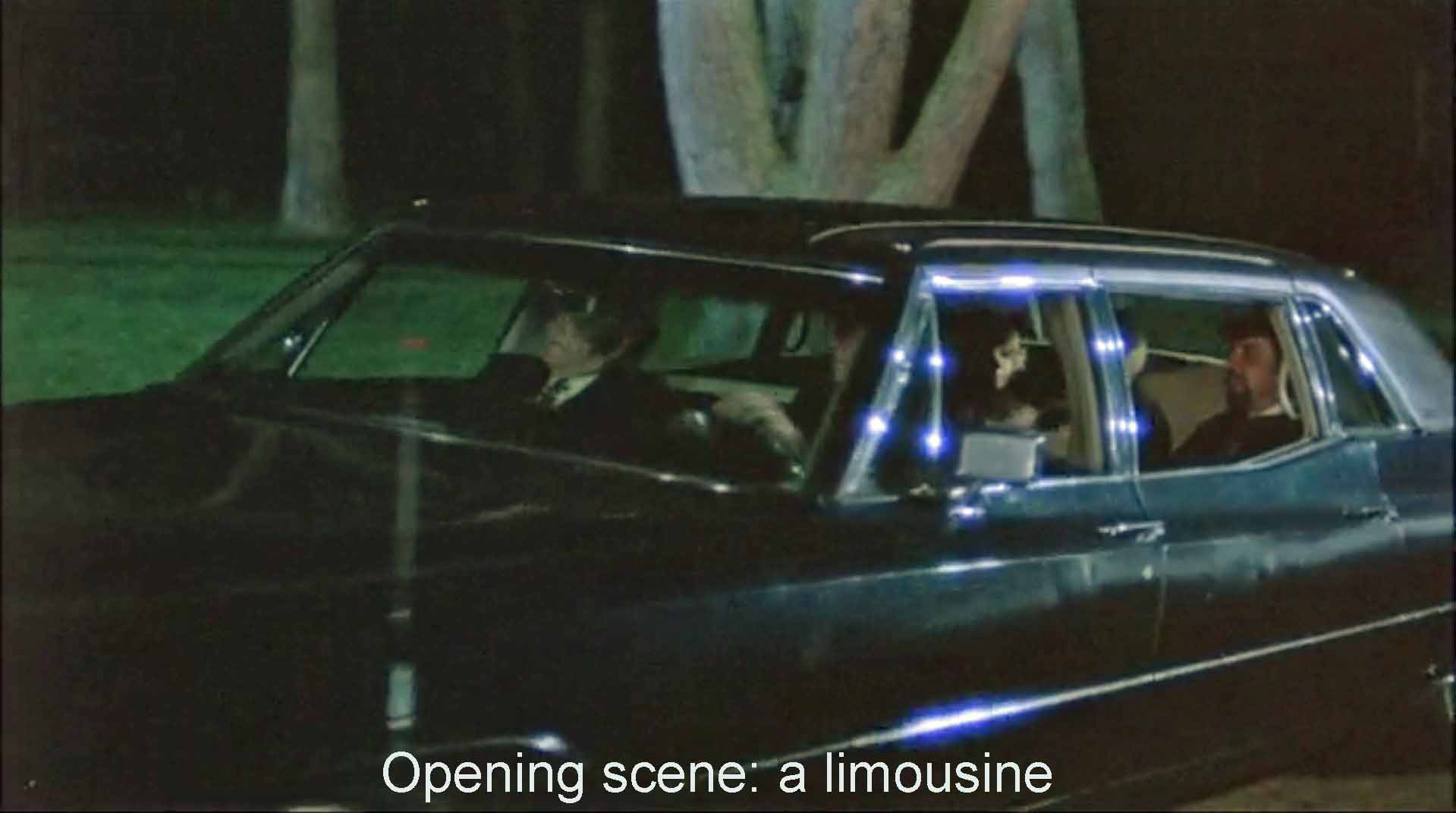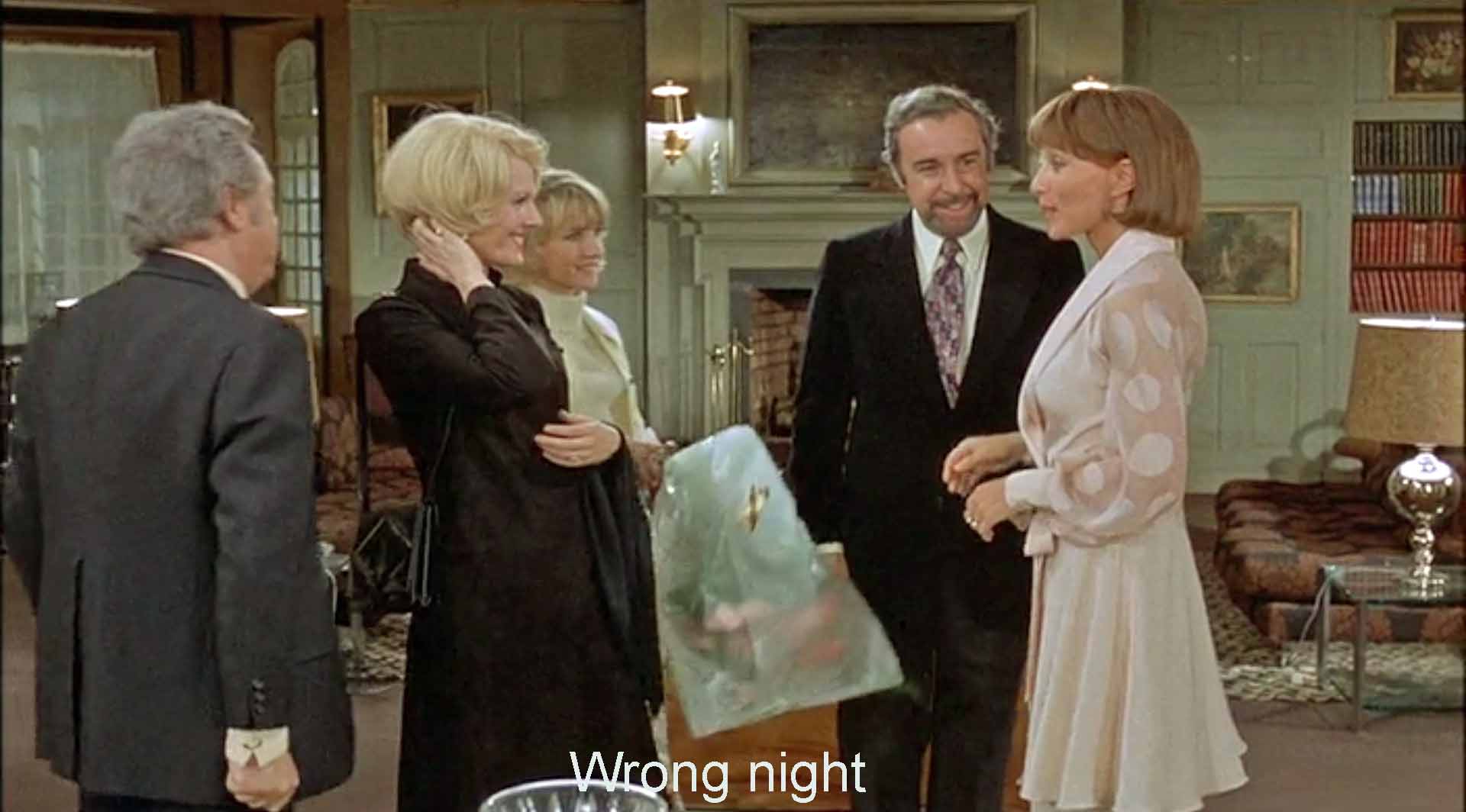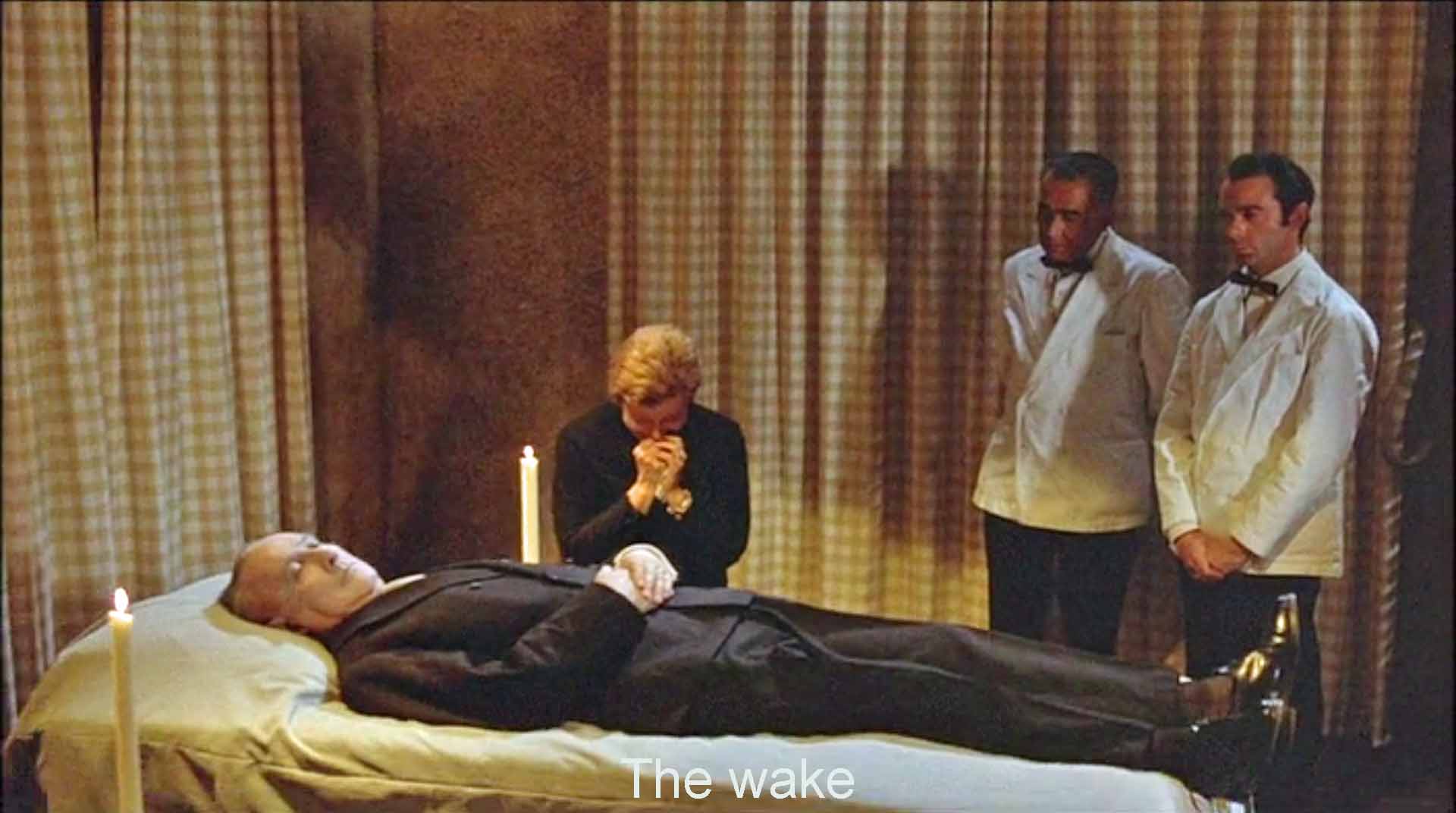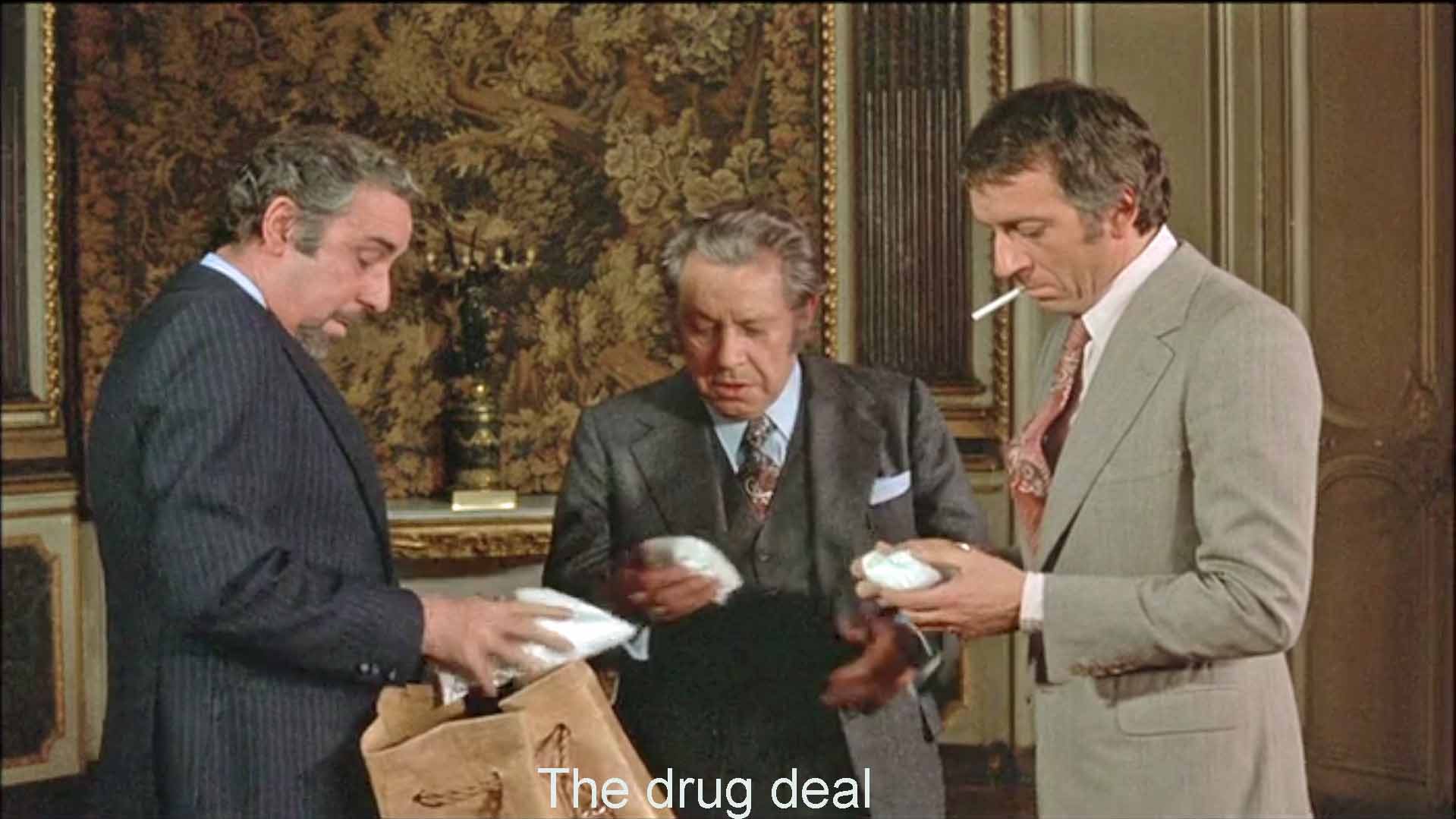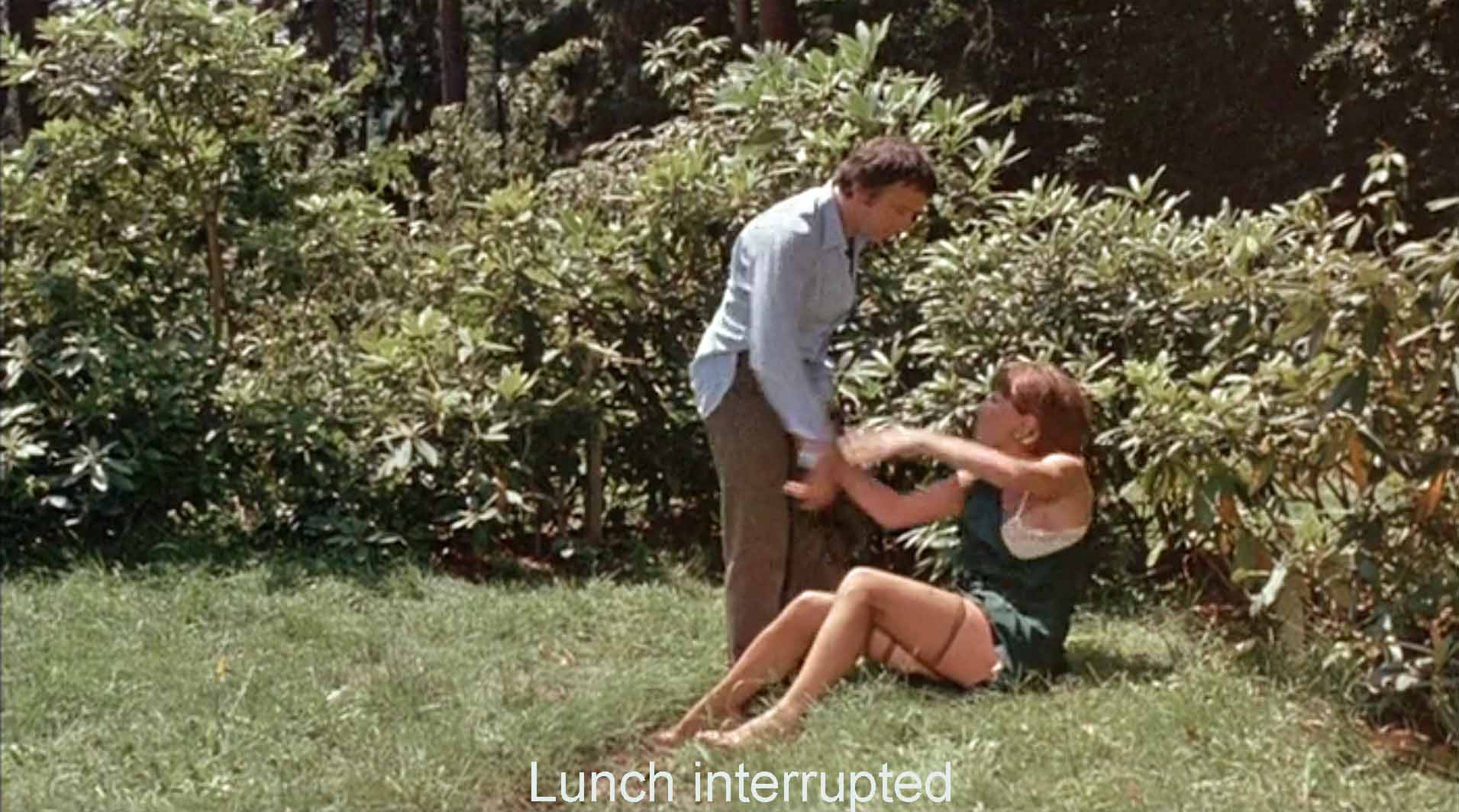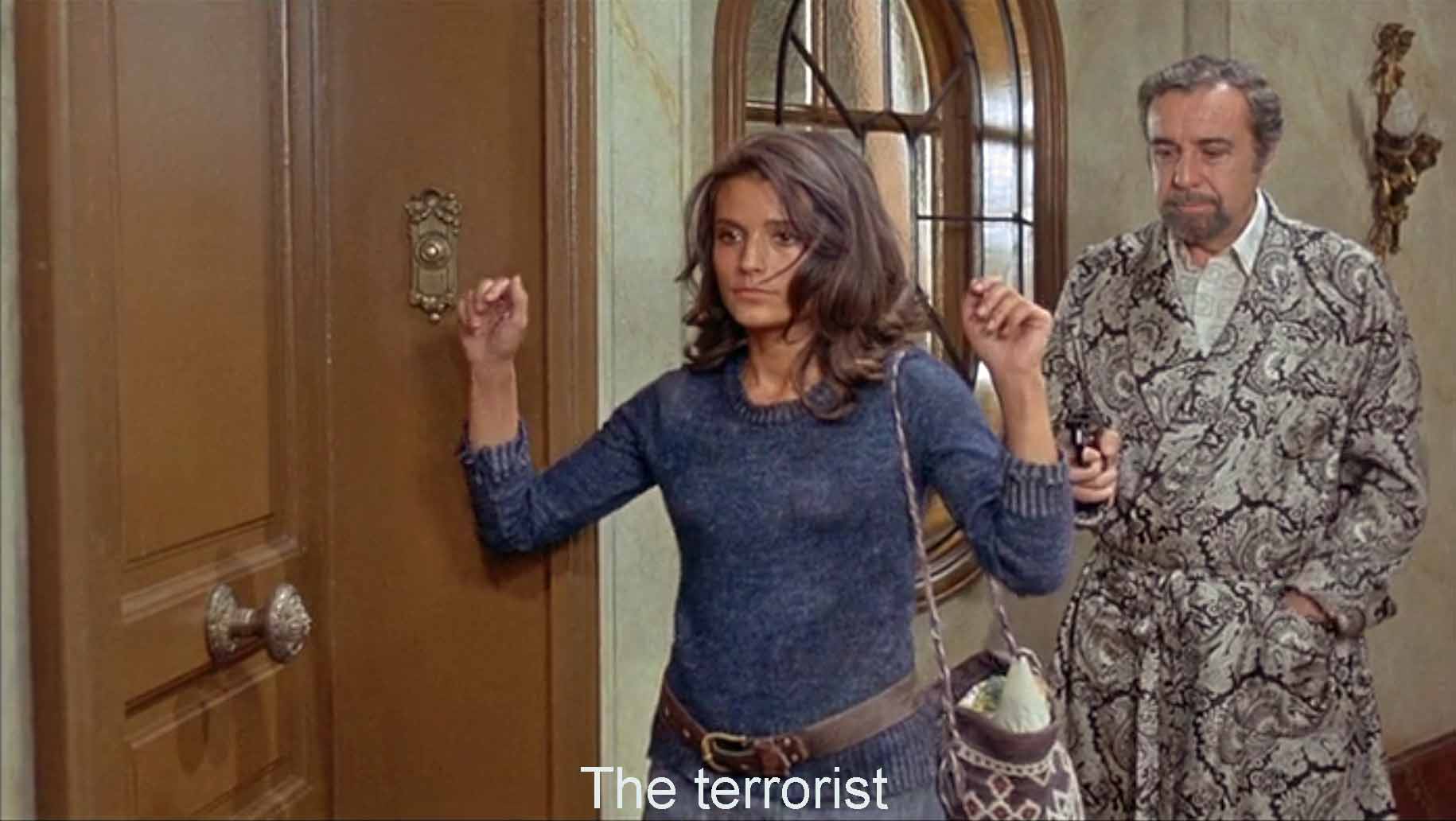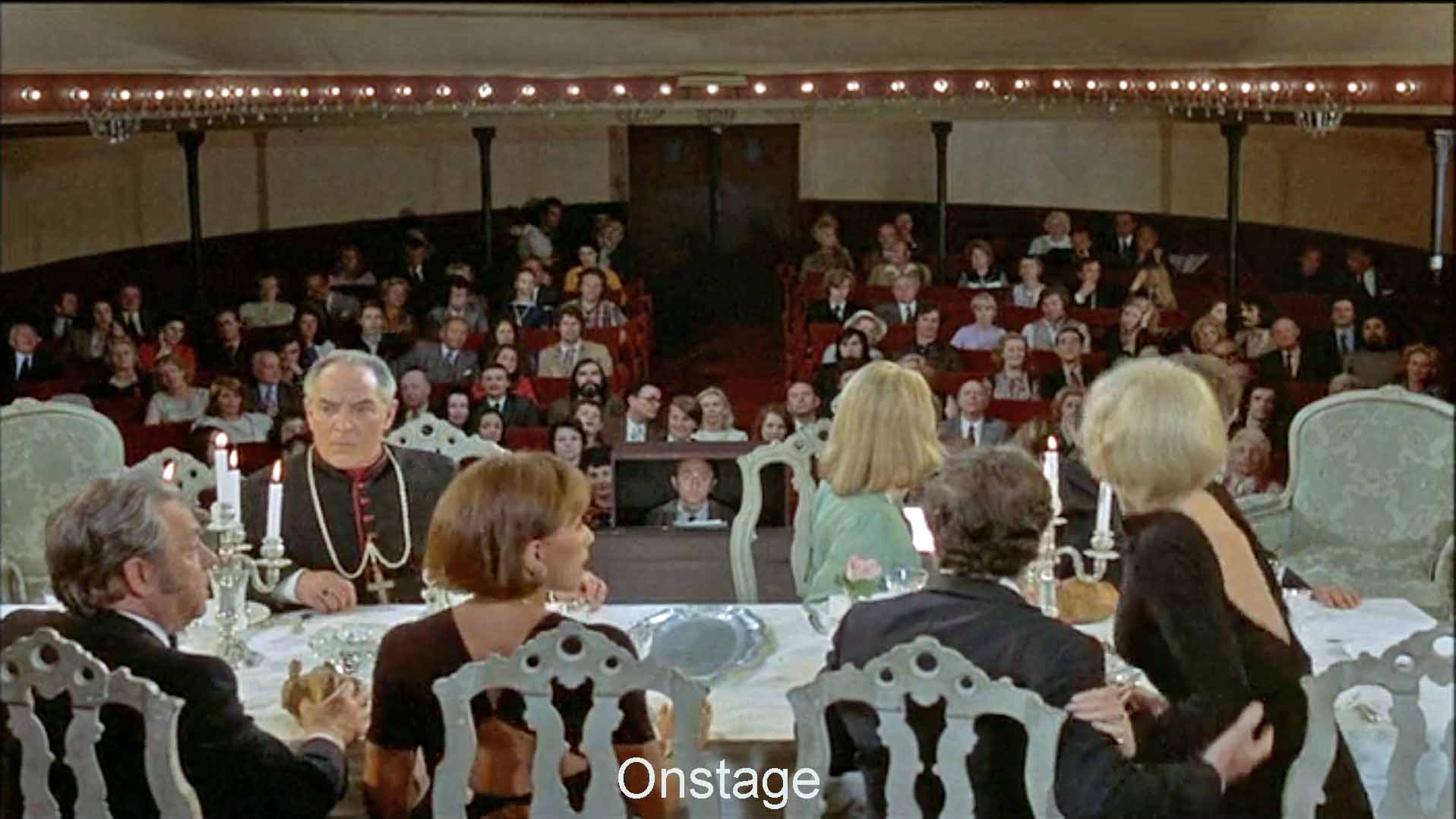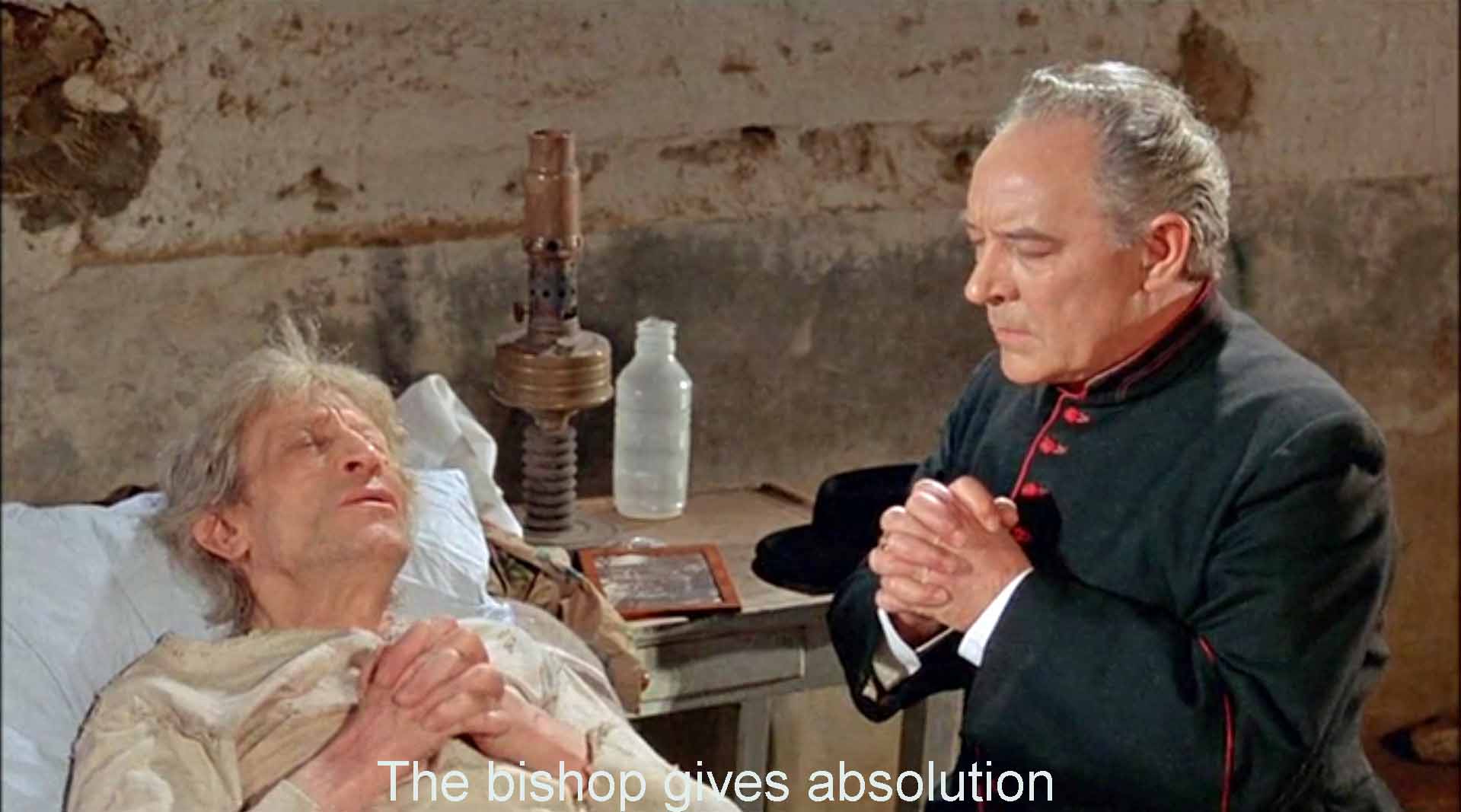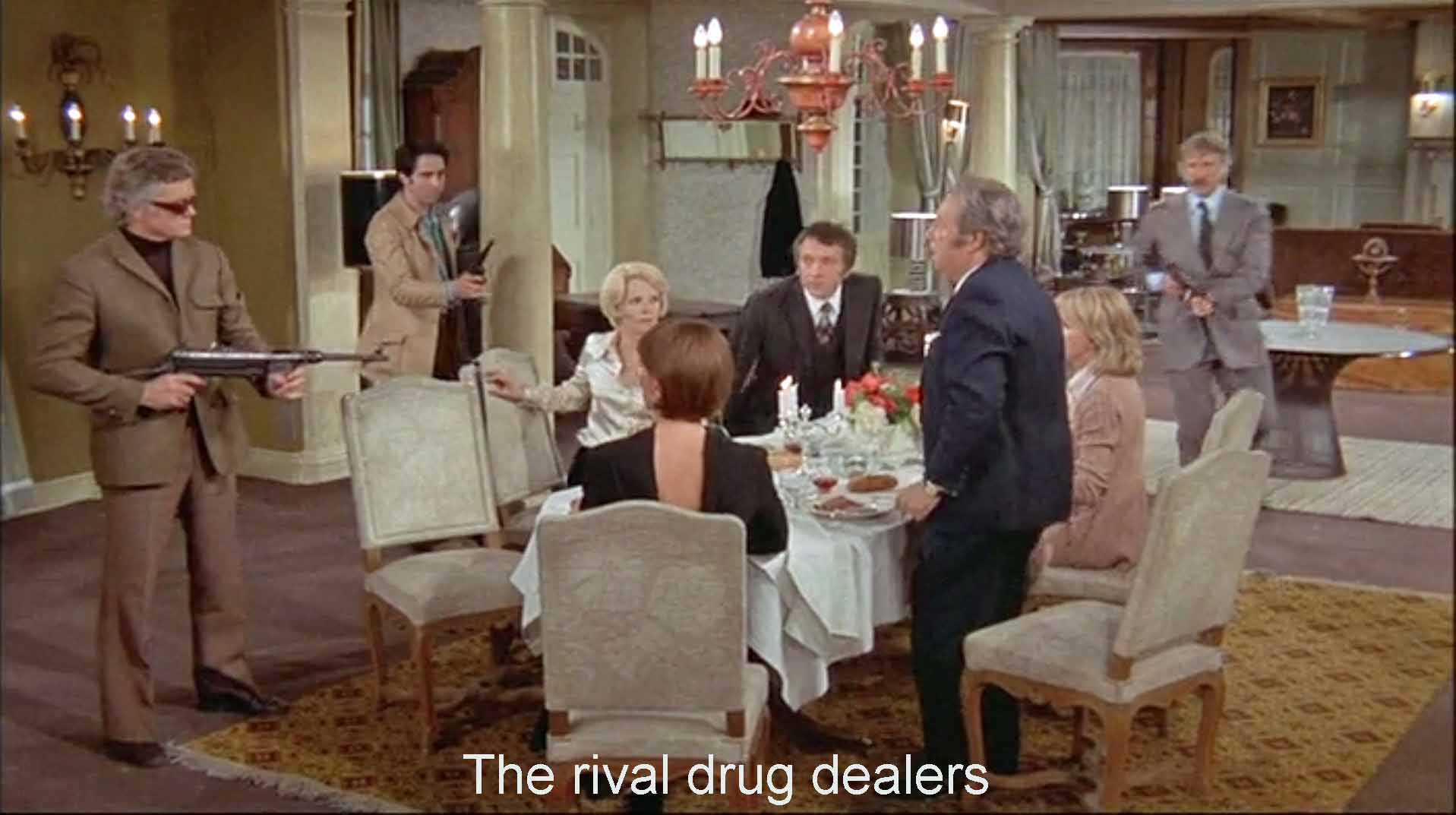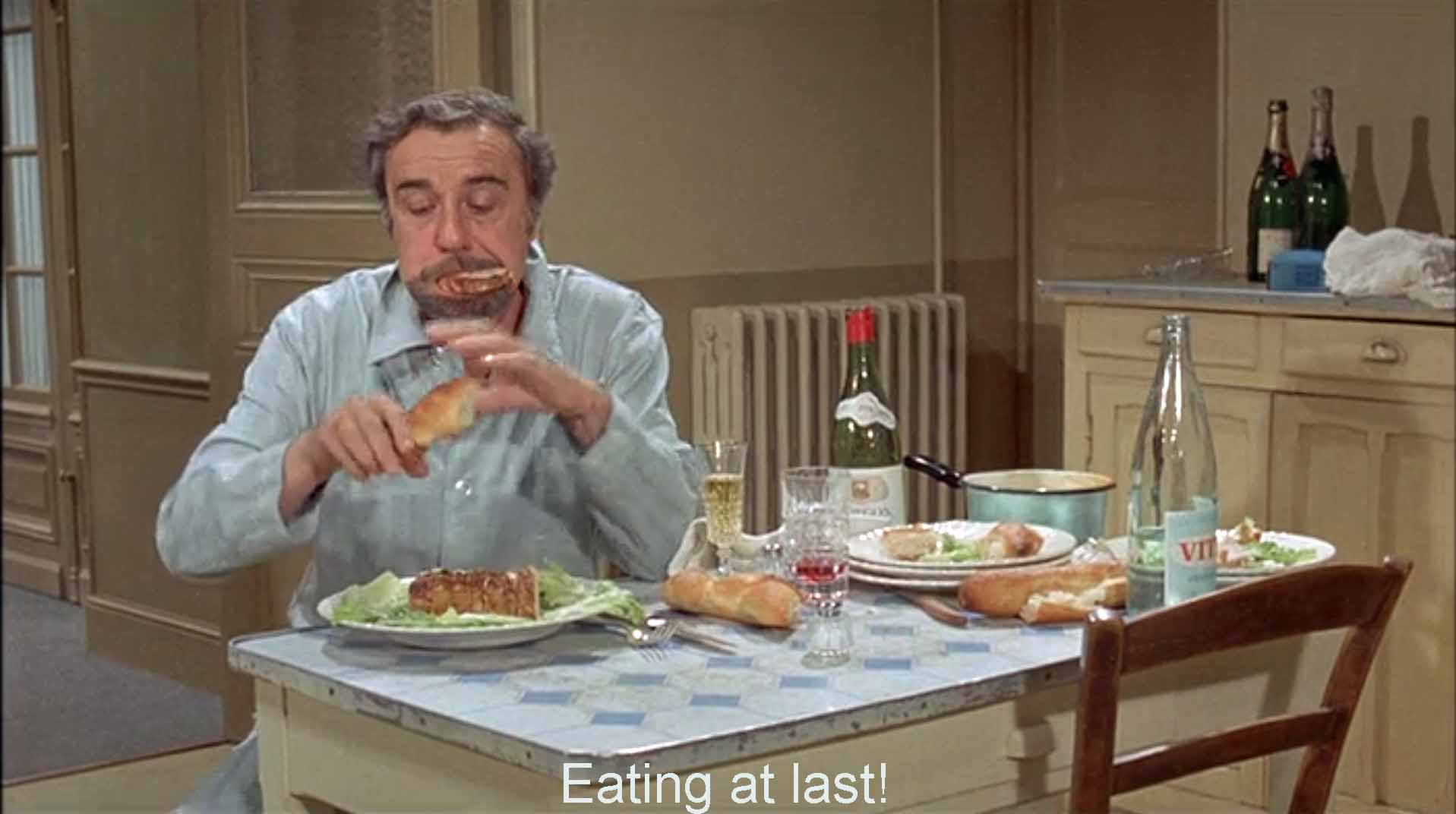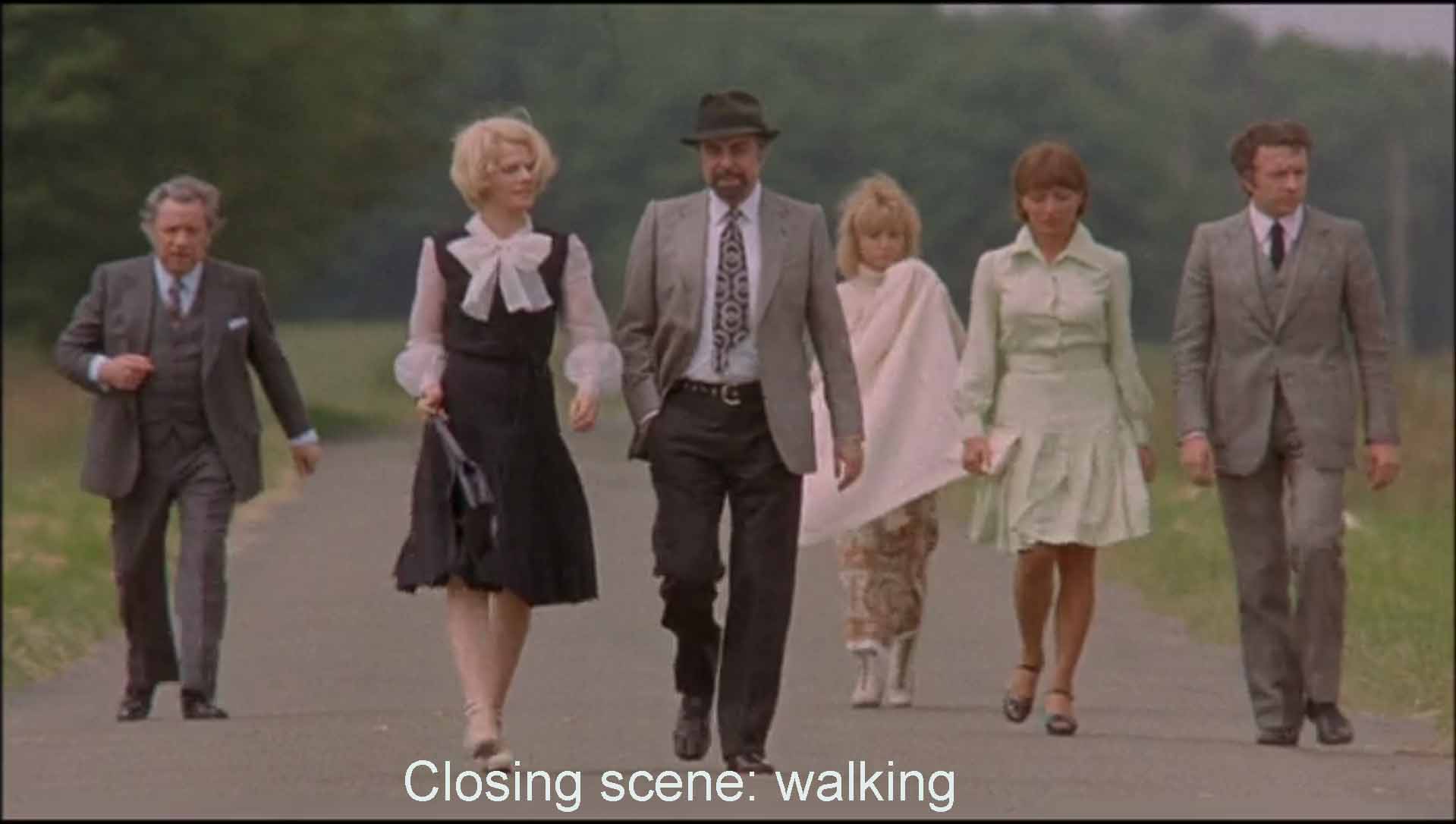This is a very strange film that despite its seeming incoherence won the 1972 Oscar for Best Foreign Language Film. Throughout, Buñuel treats bourgeois life as a succession of genteel luncheons and dinners which are interrupted. As reviewer John Simon punned, this film is co-eatus interruptus. Only at the end of the film do we see the main character furiously eating and enjoying it.
This is a film about appetite and appetite interrupted, and it is the interruptions that are more vital than the appetites. The “discreet charm” of the bourgeoisie is that their appetites for food, sex, money, and power are all undercut. Counter to the interruptions are two continuities. One, dreams. The waking life depicted in the movie glides without markers into dreams. And the dreams themselves can glide into dreams, becoming dreams-within-dreams. Two: Those dreams often have oedipal themes; adult life is continuous with childhood. There is yet a third continuity. The various dreamers wake up, and life goes on.
Buñuel has divided this puzzling film into three acts marked off by a recurring scene in which these six haut bourgeois characters walk along a country road in a quite ordinary way. I take it, this is a familiar symbol, the road of life (as in the ending of Fellini’s Nights of Cabiria). Walking on a road is realistic and plebeian as opposed to the chauffeur-driven limousines in which these rich bourgeois usually travel (as in the long first shot of the film).
The six characters are, first, the ambassador to France from the fictional Latin American country Miranda (“to be wondered at”). He is Rafael Acosta (Fernando Rey, Buñuel’s alter ego). He plus five others come to the first dinner party—or non-dinner party: a middle-aged couple, the Thévenots (Paul Frankeur, Delphine Seyrig); Florence, Mme. Thévenot’s naughty little sister (Bulle Ogier); and a younger couple, the Sénéchals (Jean-Pierre Cassel, Stéphane Audran).
Each of the three acts follow more or less the same pattern: a meal planned but interrupted, a non-eating episode also interrupted, another meal interrupted. What is interesting (and I think, Buñuel’s theme) are the interruptions. The first meal is interrupted because the parties have the wrong date—time itself is the interrupter. The six bourgeois go on to a nearby inn (”The Touch of the Saber”), but there a wake for the dead owner interrupts—death interrupts. In the middle episode, the sight of a pretty young female terrorist interrupts a drug deal (the ambassador has been smuggling cocaine in his diplomatic pouch; the U.S. ambassador was doing that, too). Politics interrupts. Next there is a lunch to make up for the mistimed dinner. That is interrupted when the hosts go off to the garden to have sex. The abandoned guests flee, fearing the hosts have hidden because they spotted the police. Sex and guilty fear are the interrupters. Food may be basic, but the interruptions are more potent and more real than these genteel meals.
This first act ends with the appearance of a bishop (Georges Douking) who wants to become the Sénéchals’ gardener. When he appears in gardener’s clothes, the Sénéchals throw him out. In his bishop’s gown, they fawn on him. So ends the first act, the Sénéchals’ sex invoking religion—hypocritical religion.
In the second act, we begin to get dreams interrupting meals. The three women go to a tea room, but there is neither tea nor coffee nor milk. One interruption is that privation. Another is the irrational: Florence’s whimsical dislike of cellos. The big interruption is a young lieutenant (Christian Baltauss) who tells a very oedipal dream in which his dead mother encourages him to kill her husband, his cold-hearted stepfather, who had killed his real father, the mother’s lover, in a duel. This is the first in a series of dreams that make the second and third acts both real and unreal—surreal. We even have dreams-within-dreams, dreams flowing into other dreams.
We go on to Acosta’s sexual rendezvous with Mme. Thévenot. Her unexplained scars interfere, and her husband interrupts, although he seems quite indifferent to the goings-on. Then Acosta has another episode, a conversation, with the terrorist. Interruptions: marriage as institution; politics and terrorism again. Acosta demonstrates the ruthlessness under his polished manner. You could say this whole film builds on a favorite saying of Chairman Mao’s: “A revolution is not a dinner party.”
The sextet tries another dinner at the Sénéchals, but this is interrupted by a colonel (Claude Piéplu) and his troops involved in war games. War, the military, is the interrupter, in turn interrupted by smoking weed. And this interruption is interrupted by another dream, a sergeant’s dream of being reunited with his mother in death. Again, an oedipal childhood.
The characters go on to a drinks-and-dinner party at the colonel’s. Seated at the dinner table, they find to their dismay that they are actually on a stage in a theater acting in a play whose lines they do not know. That turns out to be Henri Sénéchal’s dream. When the Sénéchals really get to the colonel’s, Henri and Florence and the bishop play with Napoleon’s hat, history as interrupter. The colonel says some unpleasant truths about Miranda to Acosta. (For the first time, truth as interrupter.) They insult each other, and Acosta shoots the colonel—and then M. Thévénot wakes up. With our realization that the murder was another dream, the second act ends with the characters walking on the country road.
The third act begins with a luncheon that we see only later. The bishop-gardener is invited, but interrupted; he goes off to administer the last rites to a dying man. The man turns out to have murdered the bishop’s parents, and the bishop shoots him. Religion and death and murder as interrupters.
The meal proceeds without the bishop, but is interrupted when a commissioner of police arrives (François Maistre) and arrests the six men and women, locking them up at the police station. Then follows a flashback/dream in which a bloody sergeant tortures a young radical. Cockroaches scatter from the torturing electricity. Even the cockroaches, les cafards (French slang for hypocrites), flee this business. But it turns out to be the commissioner’s dream. For the second time the interruption is police action. At the insistence of the Interior Minister (Michel Piccoli) for reasons that are drowned out by noise, the commissioner releases his bourgeois prisoners.
The sextet goes home to the Sénéchals for yet another dinner. This one is invaded by rival drug dealers, gangsters from Marseille, who shoot them all, all but Acosta. Him we find under the table, greedily reaching up for a piece of lamb—and the head gangster sees and shoots him. But he wakes up, heads to his kitchen for a snack, and, for the first time in this film (!), we see someone actually and greedily eating. The film cuts to the final scene, to the irony of these bourgeois characters walking their road, their road of life. Again and again in this film we have seen this character or that wake up from a dream to go on living, as on the road. This film portrays the persistence of these bourgeois doings, and perhaps that is their “discreet charm.”
I think there is much more to this film than I have been able to infer. I suspect, for example, that one can read the episode of the bishop-as-gardener allegorically. The Sénéchals have sex in the garden, and clothes are a problem—echoes of Genesis. When the bishop becomes a gardener, he says he is imitating the worker-priests. He is also acting out an old idea, Adam as a working gardener in Eden. As a fourteenth-century English peasant-rebel famously rhymed, “When Adam delved and Eve span, who was then the gentleman?” When he is dressed as a gardener, the Sénéchals throw him out. In his bishop’s robes they bow to him. It’s the essence of the bourgeois effort to substitute status for basic humanity. Religion has changed from obedience to power. And when the bishop first absolves, then murders the other gardener who had killed his parents, he embeds himself in human sin as Adam was embedded.
If this be a good reading, perhaps there are other episodes that allow for more complex interpretations than those that I or other critics have been able to muster.
As for the film as a whole, I found this film hard to make sense of. What do I mean by “make sense of”? I mean seeing the artistic unity of the thing, understanding an artistic work as organized around some central idea or theme. I like to have that idea in mind as I watch a film. The obvious thing this film is about is dinner parties, genteel, expensive, bourgeois dinner parties. Then, as you watch the film, you realize that the dinner parties never take place. Instead what you are seeing through most of the film is the interruptions. They form the core of the film.
We even get interruptions interrupting interruptions. For example, one dinner party is interrupted when some soldiers on maneuvers come in. Then that interruption is interrupted when the diners decide to listen to a sergeant tell his dream. Then the sergeant wants to tell another dream, but the colonel says No—an interruption of an interruption.
So what are these interruptions? Time is the first one. The guests and the hosts have mistaken the date of the dinner party. Death is the second. Terrorist rebels is a third. And on and on through the film. So you could read this film as focused on the idea, Which is more real? The things we plan? Or the things we don't plan, that just happen? Including dreams. That's a truly surrealist point of view.
